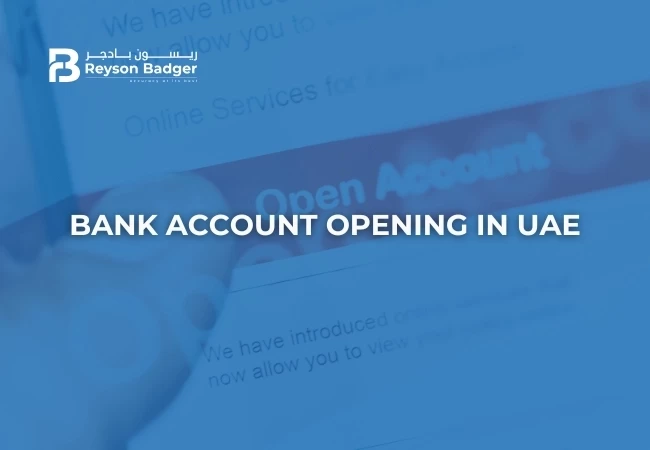
Enable quick and simple banking transactions in the United Arab Emirates! In this thriving economy, opening a bank account is a crucial first step for both individuals and companies. A favorable climate for financial growth is created by the UAE's highly developed banking system, which offers competitive interest rates and secure transactions. Opening a local bank account facilitates daily transactions, provides access to unique financial services, and opens the door to international trade for investors, entrepreneurs, and expats. This thorough tutorial covers all the necessary paperwork, eligibility requirements, and other details for opening an account with a bank in the United Arab Emirates.

Having an account in a bank in the UAE is a must-have for any individual or company. The United Arab Emirates has a well-developed banking and a sound economy, with many benefits to make it easy and at the same time indispensable, banking within this country. For example, we consider the key reasons for opening a bank account in the UAE.
There is no doubt that one of the most significant advantages an account at a bank in the United Arab Emirates provides is that it is simple and facilitative. A person can now deal with their finances conveniently using online as well as mobile banking applications available anytime, anywhere. With one click, an individual can transfer his money anywhere or pay electricity bills, and phone bills, check the current balance, or know its transactions. In addition, financial management has also become easy through modern interfaces available for users in respective apps.
The UAE has a tight regulatory regime and an advanced banking infrastructure. You can feel that your money is with them because the banks utilize the latest technologies to guard against fraud and any other illegal access attempts. The deposit accounts in the banks are also insured within a given limit, thereby adding extra protection to your hard-earned money.
With a bank account in the UAE, you become part of a global financial network. Most banks provide international banking services that enable one to manage their account and execute transactions without much hassle, regardless of their location across borders. If you travel or live abroad, accessing your money via ATMs or online banking sites will not be a problem.
A business bank account is very essential for operating any type of business-owning business. A business account helps one to carry on smooth transactions like payroll, payment to suppliers, and raising invoices from customers. Keeping personal and business finances in separate accounts simplifies accounting processes and increases financial clarity, thereby making it more convenient for expense tracking and revenue.
When you want to open a bank account in the UAE, you have to choose between two types of bank accounts existing in the region.
1. Personal Account
The personal account is given to an individual so that he can deal with the everyday expenses without any hassle. Sometimes debit cards and online banking facilities come along with such an account.
2. Business Account
Business accounts are tailored for businesses and companies. They suit various business operations and could have far more facilities, such as currency conversions and personalized relationship managers.
3. Current Account
Current accounts are ideal for those businesses with high volumes of transactions. The money is easily withdrawn using checks and debit cards. It doesn't earn interest but is highly convenient for operating day-to-day banking transactions.
4. Savings Account
Savings accounts are for those saving money with an interest earned on the deposits. The accounts have restrictions over withdrawal but pay a much higher rate of interest compared to current accounts.
Each bank may have slightly different rules, so it’s a good idea to call or visit the bank to confirm their specific requirements before applying.
The following document is normally required in order to create a bank account in the United Arab Emirates:
A valid passport is required to verify your identity as part of the account opening process.
For expatriates, a valid UAE residence visa is essential to establish residency status.
You will need to provide proof of address, such as a utility bill or tenancy agreement, to confirm your residential location in the UAE.
Banks often require proof of income, which can be provided through a salary certificate or an employment letter from your employer.
How to open a bank account in UAE?
A bank account opening in UAE is an essential requirement for an expatriate as well as an organization looking to perform successfully in this vibrant economy. Given the various banking choices, if one is aware of the steps, benefits, and necessities, it would be greatly helpful. Here's a comprehensive guide that helps to process effectively.
The first step to opening a bank account is selecting a respected bank that fits your requirements. Some of the most impressive banks in the UAE for expats and businesses are as follows:
After you select a bank, visit there and meet the relationship manager. This will be for questioning, its scope of services, and tailoring the account opening process.
To open an account, you will require these documents. These may be:
The bank will process the application after the submission of the documents. After being granted, the account will be activated with confirmation from the bank customer. In some places, it requires setting up online banking and a debit card.
Bank Account Opening for Non-Residents in UAE
Opening a bank account in the UAE as a non-resident involves specific considerations and requirements.
Special Considerations for Non-Residents
Required Documents and Processes
To open a bank account, non-residents typically need to provide:
The process generally involves submitting the required documents, completing an application form, and possibly undergoing a background check. Some banks may require an initial deposit to activate the account.
Sometimes, it may be imperative to have a good or right bank because your personal experience may vary. Hence, here are the top picks for you.
Emirates NBD
Dubai Islamic Bank
Abu Dhabi Commercial Bank (ADCB)
RAK BANK
Tips and Considerations
When a bank account opening in UAE, consider the following tips:
Before committing to a bank, ensure you understand any charges or fees associated with maintaining an account. Look out for account maintenance fees, transaction fees, and foreign exchange charges to avoid unexpected costs.
If you’re opting for a savings account, compare interest rates across different banks. Higher interest rates can significantly impact your savings over time.
In today’s digital age, ensure that the bank you choose offers robust mobile banking services. This feature allows you to manage your finances conveniently from anywhere, making it easier to conduct transactions on the go.
Be aware of the minimum balance requirements, which can vary significantly by bank. Some banks offer accounts with no minimum balance, while others may require AED 3,000 or more. Research different banks to find one that meets your needs in terms of fees, services offered, and accessibility.
A bank account opening in UAE is a relatively easy process, and with proper assistance, it can be completed easily along with the requirements to establish a secure financial base. Step by step, this guide will take you through this process to ensure things go smoothly. For help and guidance in navigating the setup of banking, consider engaging with Reyson Badger. Their expertise can streamline the process, allowing you to begin your financial life in the UAE with greater confidence. Contact Us today.
Yes, non-residents can open bank accounts in the UAE. However, the options are typically limited to savings accounts, and the process may involve additional requirements compared to resident accounts.
Minimum balance requirements depend on the type of account and the bank’s policies. Typically, savings accounts have lower requirements compared to current accounts. It’s essential to check with your chosen bank for exact details.
Opening a bank account in the UAE generally takes 3 to 5 working days, provided all required documents are complete and verified. In some cases, such as when additional compliance checks are needed, it may take up to 1 to 2 weeks.
Initiating the application process online is possible with some banks. However, non-residents are generally required to be physically present in the UAE to complete the account opening process.